 Judge Asa Biggs was born in Williamston in the county of Martin on the 4th day of February, 1811. His father was the Rev. Joseph Biggs, of the Primitive Baptist Church, and his mother was Chloe Biggs, whose maiden name was Daniel. He received his license to practice law in the County Court in 1831. He was from the beginning of his career a Democrat, differing from other members of his family. His first public service was at the age of twenty-four in the Convention of 1835. He was a member of the House of Commons in 1840 and again in 1842, and hte State Senate in 184. He was elected to the House of Representatives in 1845 and was again a candidate in 1847, but suffered defeat. The Legislature of 1854 elected him to the United States Senate where he served until 1858, when President Buchanan appointed him to fill the United States District Judgeship for North Carolina made vacant by the death of Judge Potter, which position he held until the civil war.
Judge Asa Biggs was born in Williamston in the county of Martin on the 4th day of February, 1811. His father was the Rev. Joseph Biggs, of the Primitive Baptist Church, and his mother was Chloe Biggs, whose maiden name was Daniel. He received his license to practice law in the County Court in 1831. He was from the beginning of his career a Democrat, differing from other members of his family. His first public service was at the age of twenty-four in the Convention of 1835. He was a member of the House of Commons in 1840 and again in 1842, and hte State Senate in 184. He was elected to the House of Representatives in 1845 and was again a candidate in 1847, but suffered defeat. The Legislature of 1854 elected him to the United States Senate where he served until 1858, when President Buchanan appointed him to fill the United States District Judgeship for North Carolina made vacant by the death of Judge Potter, which position he held until the civil war.
In 1851 Governor Reid appointed Judge Biggs with Hons. B.F. Moore and R.M. Saunders to revise and compile the Statues of North Carolina, the result of which was the “Revised Code” of 1854. He resigned from the Convention of 1861 to accept the Confederate District Judgeship. After the war terminated he did not again enter public life. In 1870 he formed a partnership for the practice of law with Hon. W.H. Smith. He had large business interests in Norfolk, Virginia, where he later removed and died there on March 6, 1878. In religion he was a Primitive Baptist. Judge Biggs believed that any State had the right, when sufficient cause existed, to withdraw from the Union by the same method which it entered, and by such a proceeding the citizens were absolved from further allegience to the United States. He advocated the plan of constructing a railroad from Beaufort to the mountains at the expense of the State. Asa Biggs is buried in Elmwood Cemetery in Norfolk, Virginia.